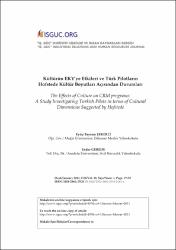| dc.contributor.author | Şekerli, Bayram Eyüp | |
| dc.contributor.author | Gerede, Ender | |
| dc.date.accessioned | 2019-10-22T20:07:07Z | |
| dc.date.available | 2019-10-22T20:07:07Z | |
| dc.date.issued | 2011 | |
| dc.identifier.issn | 1303-2860 | |
| dc.identifier.uri | http://www.trdizin.gov.tr/publication/paper/detail/TVRFNU56Y3lNZz09 | |
| dc.identifier.uri | https://hdl.handle.net/11421/22216 | |
| dc.description.abstract | Havayolu sektörü emniyetin ön planda olduğu sektörler arasındadır. Havayolu taşımacılığında kullanılan teknoloji emniyet seviyesinin yükseltilmesinde önemli bir role sahiptir. Yüksek teknolojiye rağmen, kaza ve kırımlar tamamen önlenememiştir. Araştırmalar insan hatalarını kaza ve kırımların birincil nedeni olarak göstermektedir. İnsan hatalarının nedenlerini araştıran ve yönetilmesinde metotlar geliştiren “İnsan Faktörleri” disiplini kokpit içerisinde hataların önlenmesi için çalışmalar yapmaktadır. Uçuş emniyetini sağlamak, insan hatalarını engellemek ve yönetmek için geliştirilen bir İnsan Faktörleri uygulaması olan Ekip Kaynak Yönetimi (EKY) dünya genelinde birçok havayolu işletmesinde kullanılmaktadır. Fakat bu programların verimliliği ekip üyelerinin kültürel değerlerine uyumlandırılmasına bağlıdır. Ekip Kaynak Yönetimi programları; ulusal, örgütsel ve meslek kültürleri incelenerek tasarlanması gerekmektedir. | en_US |
| dc.description.abstract | Airline industry is one of the sectors in which safety is primarily important. In this respect, the use of technology has a significant role in increasing the safety standards to a desired level in air transportation. Unfortunately, these attempts have not been successful in eliminating accidents and incidents completely. Many studies show that the primary reason for these accidents and incidents is human factor. The discipline called human factors” deals with the precautions that might be taken to prevent human-related errors observed in the cockpit by examining the reasons behind such errors and developing methods for managing these errors. Today, most of the air companies worldwide are using Crew Resource Management” (CRM) programs designed to establish flight safety and to prevent and manage such possible human-related errors. However, it is commonly believed that the efficiency of such programs depends on how they are adapted to the cultural values of the particular crew it is applied. In other words, CRM programs should be designed after national, organizational and vocational cultures of this particular group are examined thoroughly. | en_US |
| dc.language.iso | tur | en_US |
| dc.rights | info:eu-repo/semantics/openAccess | en_US |
| dc.subject | Konu Ataması Yapılmamış | en_US |
| dc.title | Kültürün EKY’ye etkileri ve Türk pilotların hofstede kültür boyutları açısından durumları | en_US |
| dc.title.alternative | The effects of culture on CRM programs: a study investigating Turkish pilots in terms of cultural dimensions suggested by hofstede | en_US |
| dc.type | other | en_US |
| dc.relation.journal | İş Güç Endüstri İlişkileri ve İnsan Kaynakları Dergisi | en_US |
| dc.contributor.department | Anadolu Üniversitesi, Sivil Havacılık Yüksekokulu | en_US |
| dc.identifier.volume | 13 | en_US |
| dc.identifier.issue | 1 | en_US |
| dc.identifier.startpage | 17 | en_US |
| dc.identifier.endpage | 38 | en_US |
| dc.relation.publicationcategory | Diğer | en_US] |
| dc.contributor.institutionauthor | Gerede, Ender | |


















